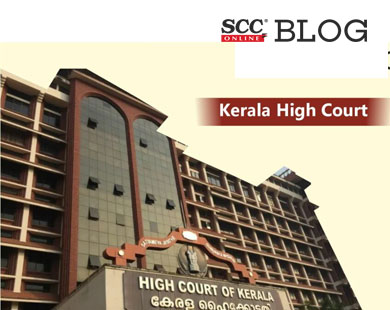Kerala High Court: In a criminal appeal against conviction of doctors and nurses in a medical negligence case, Kauser Edappagath, J. acquitted the medical staff and held that every death of a patient per se cannot be a case of medical negligence. The instant matter relates to the death of a healthy lady following a simple procedure for laparoscopic sterilization.
As revealed by the facts, the deceased underwent sterilization by laparoscopy, after which, she developed some respiratory complications and could not be saved. A criminal case was registered against the doctors and nurses alleging medical negligence. During investigation, an expert panel was constituted, whose report led to incorporation of offences under Sections 304, 201 and 34 of Penal Code, 1860 (‘IPC'). The matter was committed to Additional Sessions Court through Judicial Magistrate First Class for trial and disposal. The Court discarded Section 304 IPC, but found offences punishable under Sections 304A, 201 and 34 of IPC applicable and sentenced the accused to simple imprisonment. The Trial Court held all the accused persons liable for criminal negligence, since the main accused was not a qualified anesthesiologist, but he administered spinal anesthesia instead of general anesthesia without pre-operative evaluation of the patient or an accreditation to conduct laparoscopic surgery.
The accused persons challenged the said conviction and sentence, while the victim challenged the deletion of Section 304 of IPC. The Court discussed the law behind negligence in detail and noted the doctor's duty of care imposed by law for treating patients. It was noted that the jurisprudential concept of negligence differs in civil and criminal laws with ordinary negligence rendering a person civilly liable, while criminal negligence being a greater failure about the degree of negligence.
The Court observed that “while fixing the parameters of liability in medical negligence cases, the judicial forums must aim at balancing the doctor's autonomy to judge, with the patients' right to be dealt with fairly, recognising the complexity of human body, inexactness of medical science, the inherent subjectivity of the process, and genuine scope for error of judgment.”
The Court cited the Bolam Test of BOLAM v. FRIERN HOSPITAL MANAGEMENT COMMITTEE, [1957] 1 WLR 582,which laid the principle that “a Doctor is not guilty of negligence if he has acted in accordance with a practice accepted as proper by a responsible body of medical men skilled in that particular art”. The principle has been applied by various Indian Courts to test the pleas of medical negligence including Jacob Mathew v. State of Punjab, (2005) 6 SCC 1.
The Court referred to a catena of cases starting with John Oni Akerele v. King, 1942 SCC OnLine PC 29 wherein, the Privy Council held that a doctor is not criminally responsible for a patient’s death, unless his negligence or incompetence went beyond a mere matter of compensation between subjects and showed such disregard for the life and safety of others as to amount to a crime against the State. Reference was also made to Syad Akbar v. State of Karnataka, (1980) 1 SCC 30 , wherein it was held that negligence to be established by the prosecution must be culpable or gross, and not merely based upon an error of judgment. The Court held that medical professionals cannot be held liable simply because things went wrong due to mischance or misfortune, and that mere deviation from normal professional practice is not necessarily negligence. The Court relied on the Expert Panel's report according to which doctors with MBBS registration are qualified to give anesthesia and there are expert opinions that laparoscopic sterilization could be done under spinal or general anesthesia. The Court held that “to impose criminal liability under section 304A of IPC, it is necessary that the death should have been the direct result of a rash or negligent act of the accused. That act must be the proximate and efficient cause, without the intervention of another’s negligence.”
The Court referred to evidence on record and ruled out the prosecution theory that administration of spinal anesthesia caused Acute Respiratory Distress Syndrome (‘ARDS')/Hypoxia resulted in patient's death. The Court acquitted the appellants in the instant case and held that there is no convincing evidence to connect the accused with the alleged incident, thus, they are entitled to get the benefit of doubt. Hence, the conviction and sentence under Sections 304A and 201 with 34 of Penal Code could not be sustained.
While dealing with the prosecution's challenge against acquittal under Section 304 of IPC, the Court concluded that the accused lacked the degree of knowledge to the extent that their act may cause the patient's death, due to which, the provisions of Section 304 IPC were not attracted. However, acknowledging the difference between civil and criminal liability in case of medical negligence, the Court noted that the acquittal under Section 304A of IPC will not have any bearing on the appeal pending before the National Commission for award of compensation.
[Philips Thomas v. State of Kerala, 2023 SCC OnLine Ker 686, decided on 02-02-2023]
Advocates who appeared in this case :
For Appellants: Advocate Thampan Thomas, Advocate Jacob Chacko, Advocate B.V. Joy Sanker, Advocate Jancy Alex, Advocate Shaffie Thomas, Advocate Saneesh Kunjukunju, Senior Advocate P. Vijaya Bhanu, Advocate M. Revikrishnan, Advocate Vipim Narayan, Senior Advocate S. Sreekumar, Advocate P. Martin Jose, Advocate M.A. Mohammed Siraj, Senior Advocate Jayanth Muthuraj, Advocate S. Ananthakrishnan, Advocate Keerthivas Giri.
For Respondents: Advocate P. Martin Jose, Advocate Ababthakrishnan, Advocate Prijith, Advocate Thomas P. Kuruvilla, Advocate N.K. Subramanian, Senior PP T.V. Neema
Amicus Curiae: Advocate V. Vinay







